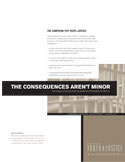The Consequences Aren't Minor
The Consequences Aren’t Minor: The Impact of Trying Youth as Adults and Strategies for Reform
 This March 2007 study examines the laws and data in seven key states: California, Connecticut, Florida, Illinois, North Carolina, Virginia, and Wisconsin. An estimated 200,000 youth end up in the adult system each year, and 40 states allow or require the jailing of these youth in adult facilities before they ever go to trial. They are often held in adult jails for months or years, even though they are charged with nonviolent offenses. Research indicates that sending youth to the adult criminal justice system doesn't work to reduce crime. Jails are not designed to safely hold youth, who are either incarcerated in cells with adults, or separated in forms of isolation that can lead to depression or even suicide.
This March 2007 study examines the laws and data in seven key states: California, Connecticut, Florida, Illinois, North Carolina, Virginia, and Wisconsin. An estimated 200,000 youth end up in the adult system each year, and 40 states allow or require the jailing of these youth in adult facilities before they ever go to trial. They are often held in adult jails for months or years, even though they are charged with nonviolent offenses. Research indicates that sending youth to the adult criminal justice system doesn't work to reduce crime. Jails are not designed to safely hold youth, who are either incarcerated in cells with adults, or separated in forms of isolation that can lead to depression or even suicide.
The laws are not evenly applied, with youth of color and those without access to adequate legal counsel more likely to end up in adult correctional facilities. Nationwide, three out of four young people admitted to adult prison in 2002 were youth of color. The report also notes that juvenile judges are frequently excluded from the decision to prosecute youth as adults. Instead, prosecutors and state laws determine which youth end up in the adult system, no matter how minor the offense.
The report urges policy makers to take advantage of the shift in public opinion and the new adolescent brain development research that inspired the Supreme Court to end the death penalty for minors. The report calls for a ban on the incarceration of youth in adult jails or prisons, and in the rare cases where the seriousness of a crime warrants consideration of prosecution in the adult system, a juvenile court judge should make the decision rather than prosecutors or state law.

